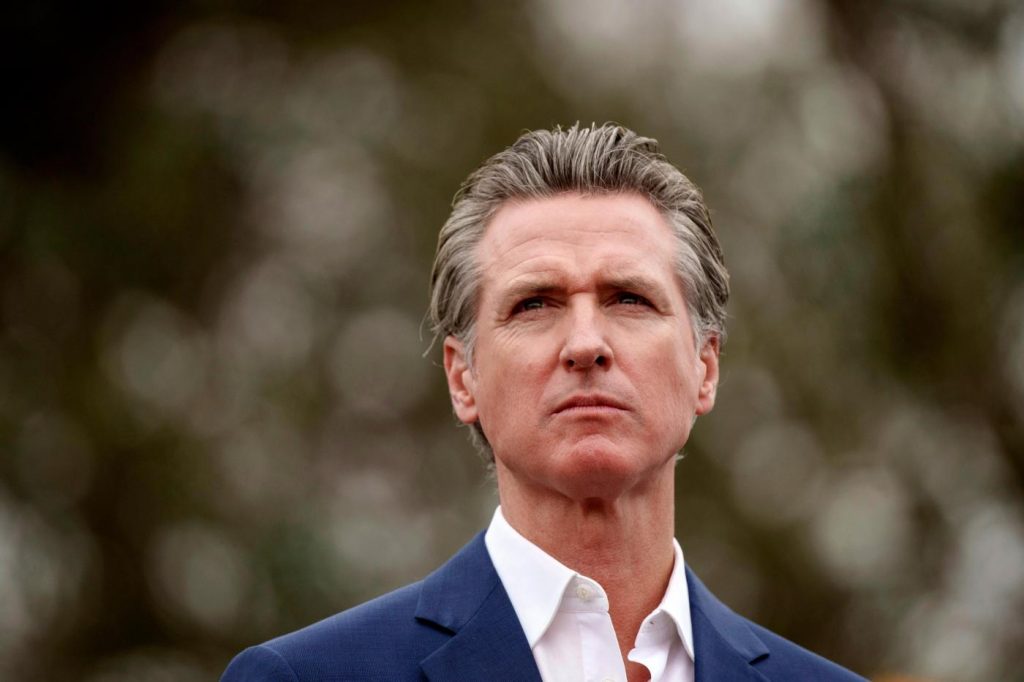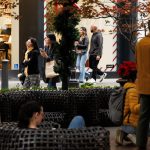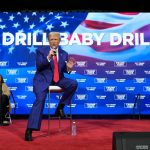California Gov. Gavin Newsom picked an unlikely spot for one of his first appearances since Democrats took a walloping in the November general election: a Kern County cement plant in Lebec, population 1,200.
Newsom is on a tour of the Central Valley, far from his native San Francisco, to highlight a statewide economic development plan rolling out in January. That initiative, California Jobs First, is years in the making and will dole out $120 million for workforce development and green industries early next year. Last week, the governor also touted the initiative at a community college in Fresno.
But the tour is also a venue for the staunch Democrat to make his presence known among voters in conservative counties, where Republican President-elect Donald Trump made significant inroads this year, fueled by anxiety about the economy and living costs.
“I’m not focusing on the politics,” Newsom told reporters this week. “But I’m deeply mindful of the politics.”
The governor, who helped lead the opposition to Trump during his first presidency by touting California’s progressive policies on everything from the environment to immigration, is widely expected to run for president in 2028 — a lane that opened for him with the defeat of his political colleague, Vice President Kamala Harris. Even as he’s promised to protect reproductive rights and environmental regulations, he’s made a habit of visiting rural counties that don’t fully support him as governor.
California Gov. Gavin Newsom touts Kern County’s economic development plan Monday, Nov. 25 at a cement plant in Lebec.
“It’s no secret he’d be interested in running for president some day,” said Jack Pitney, a professor of political science at Claremont McKenna College and a former Republican. “Smarter Democrats understand they’d have to make some inroads into rural America.”
At the moment, they’re losing ground. Trump won Fresno County this year by 4 percentage points, marking the first time a Republican candidate for president has won there since 2004. Trump also trounced Harris in once-purple Kern County this year. Though he made gains throughout the state, Harris easily won California’s 54 electoral college votes.
Newsom himself is down in the polls. A Public Policy Institute of California survey in October found only 47% of California likely voters approved of Newsom’s performance as governor, down from 52% shortly before he won reelection two years earlier.
Since Trump’s victory, Newsom has held a nationwide livestream on Zoom with voters and solicited donations to his political committee, Campaign for Democracy, which raised millions of dollars this year for Democratic candidates nationally. He may be able to use those funds for a possible run for president, said Richard Hasen, an election law expert and political science professor at the University of California, Los Angeles School of Law.
Last week, Newsom told The New York Times that voters had sent a clear message to Democrats: they should be focused on economic issues.
“People are being left behind, their regions are being left behind,” the governor told the newspaper. “We as a party will be history if we don’t heed the call to address the economy.”
While acknowledging the ire of voters, Newsom is also preparing to spar once again with Trump. In the wake of the election, he quickly called a special session of the state legislature “to protect civil rights, reproductive freedom, climate action and immigrant families” from the new administration.
On Monday, Newsom also announced that California would create its own tax credit for electric vehicles if Trump follows through with his promise to gut a federal incentive. Notably, Tesla vehicles, even those made in Fremont, wouldn’t be eligible for the state incentive under Newsom’s draft plan, Bloomberg reported. CEO Elon Musk is slated to take a role in Trump’s cabinet to slash government spending.
Clad in his signature slim-tailored suit at a news conference Monday, Newsom praised the National Cement plant about 40 miles south of Bakersfield.
It’s considered one of the lowest-carbon cement factories in the U.S. in an industry with an enormous climate impact, Newsom said. The company is set to receive $500 million for carbon capture and the development of lower-carbon cement in California as part of President Joe Biden’s 2022 Inflation Reduction Act.
The plant is emblematic of a “circular” economic investment that provides good-paying union jobs, Newsom said.
His remarks and those of other officials mostly focused on the new regional economic development roadmap for Kern County. The county, which is bigger than Connecticut, is a longtime hub for agriculture and trucking. It also produces more oil than any other county in the state.
The plan calls for job-creating investments in agriculture technology, clean energy and advanced manufacturing to replace oil jobs that are blinking out amid the clean energy transition, said Manpreet Kaur, a Bakersfield city commissioner who led the process to write the plan.
Related Articles
Gov. Newsom sets himself up as a foil to Elon Musk and Donald Trump
Opinion: The best way California can prepare for Trump? Fix its state government
Tesla excluded from EV buyer credits in Gov. Newsom’s proposal
California could offer electric vehicle rebates if Trump eliminates tax credit, Newsom says
Letters: Build relationships | Whatever it takes | Americans unite | Taking credit | Voters’ choice | Sound healing
“Kern County is the legacy land of oil country,” she told Bay Area News Group. “As we look toward the new economy for Kern County, we are also humble enough as a region to know that it’s going to take a collaborative effort to design what that looks like.”
Last week, Newsom and local officials also unveiled an economic development strategy for Fresno County at Fresno City College, where they also spoke with technical students.
Kaur credited Newsom for visiting Kern County early in his tour and said that was intentional. It’s unclear where future tour stops will be located, but the governor is expected to visit more conservative areas.
“I respect that highly,” she said, “and I think it speaks volumes.”


